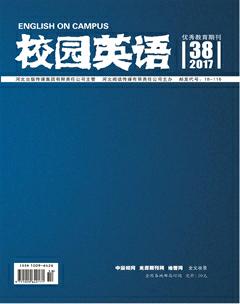A Study on Willingness to Communicate in English of Chinese English Major Postgraduates in Instructional Context
Liu+Haicui
【Abstract】This study aims to investigate characteristics and influencing factors of English major postgraduates willingness to communicate. Major findings: (1) students displayed a moderately low level of willingness to communicate. (2) personality, English proficiency, self-perceived proficiency, classroom atmosphere and motivation have an influence on students willingness to communicate.
【Key words】willingness to communicate; English proficiency
1. Introduction
MacIntyre et al.(1998) pointed out that self-perceived communication competence has a crucial influence on English learners WTC. A person with high self-perceived communication competence may take part in the activity more willingly while low self-perceived communication competence is inclined to escape from communication. Therefore, it is necessary to investigate the characteristics of postgraduates willingness to communicate and influencing factors. MacIntyre describes L2 WTC as “a readiness to take part in discourse at a certain time with a certain person or persons using a L2”. MacIntyre and Charos(1996) proposed a path model of willingness to communicate in L2, which acts as the turning point in the researches on willingness to communicate. Learners personality characteristics are closely related to learners willingness to communicate.
The research questions are: (1)What are the main characteristics of students willingness to communicate in English inside the classroom?(2)What are the main factors affecting students willingness to communicate inside the classroom?Participants are two students from English Education Program. They graduated from university and spent one and a half year in the program. Both participants had studied English for eleven years. One of them is talkative in class and the other always keep silent. Therefore, they are worth being subjects because of their contrast performances. The instruments applied in this study consist of interview and class observation with quantitative method.
2. Data analysis
After data collection, the researcher read the interview transcripts and watched the videotape repeatedly. The researcher try to find out the informational words from the interview and field notes. Analyse each sentence and action from classroom atmosphere, teacher, and pedagogy aspects.
3. Findings
Most students keep silent and think over the question for a long time. Only the students who know the answer will interact with teachers. Students are more willing to answer those Yes/No questions. And only If he/ she was asked to answer, he will answer it. In a word, students has low willingness to communicate in class. They are likely to be listeners rather than speakers. Students willingness to communicate are greatly influenced by their mastering degree of questions, their self-perceived communication competence. If the question they are familiar with, they will have the willingness to communicate. Only when they have one hundred percent, they are willing to communicate. In the postgraduates stage, they pay much attention to whether their performance matches their learning stage. Students who have better self-perceived communication have stronger willingness to communicate. If they have no confidence in their English proficiency or can not express himself clearly, they will not communicate. Students who are extroverted are tend to interact with teachers. Some students are accustomed to the traditional teaching method “spoon-feed” and they tend to listen to teachers and never doubt the rightness of the teacher even never think of the question in depth. Therefore, they have low willingness to communicate. The teachers evaluating system on daily performance can motivate some students to answer teachers questions. The class atmosphere also influence students willingness to communicate. Both students hope the class atmosphere comfortable and the teacher are amiable. Concerning to the teaching method, the teacher should combine the “lecture method”and “interaction method” together. When it comes to the familiar topic, the teacher should adopt the interaction one; if not, the lecture one. The teacher should arrange group discussion activities for students to prepare the answer. Three implications: Creating a relaxing learning atmosphere inside the classroom. Protecting students self-esteem Cooperation among teacher and learners is needed.
References:
[1]MacIntyre,P.D.,Clement,R.,Dornyei,Z.,Noels,K.A.,1998.Conceptualizing willingness to communicate in a L2:a situational model of L2 confidence and affiliation[J].Modern Language Journal 82:545-562.
[2]MacIntyre,P D.&Charos,C.1996.Personality,attitudes,and affect as predictors of second language communication[J].Journal of Language and Social Psychology,5:3-26.endprint

